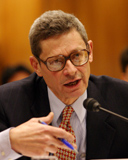CFR.org | America's Human Rights List
/The annual release of a report on human rights by the U.S. State Department is mandated by law, and the Bush administration is hardly the first to face uncomfortable questions about its qualifications to judge such issues. As usual, this year's report reviews progress and pitfalls around the world—not including the United States—and highlights major offenders. But senior officials acknowledged the report also comes at a time when Washington's own adherence to human rights principles is under fire.





